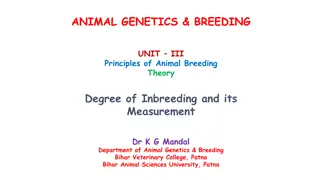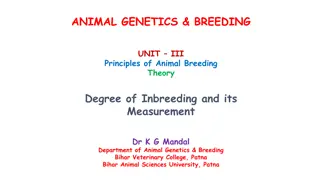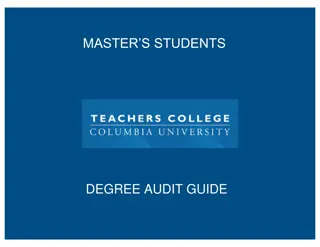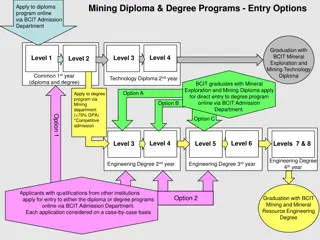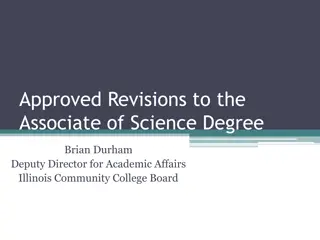The Business Transfer Degree
The Business Transfer Degree at Wenatchee Valley College is designed for students planning to pursue a bachelor's degree in business or a related major. This program offers a direct transfer agreement with various universities in Washington State, preparing students for transfer as juniors with 90 c
0 views • 24 slides
Explore the Two-Year Master's Degree in International Relations Virtual Fair 2024
Join the Master's Degree in International Relations Virtual Fair 2024 presented by the Department of Political and Social Sciences at the University of Bologna. This program offers a comprehensive two-year curriculum covering International Affairs, European Affairs, and Crime, Justice, and Security.
2 views • 13 slides
Actions Emanating from the Evaluation of the Governance Reform
The evaluation of the governance reform within the WMO aimed to assess its alignment with strategic objectives, effectiveness in responding to societal needs, coordination efficiency, decision-making process, agility, and more. Evaluation criteria included relevance, design validity, effectiveness,
1 views • 13 slides
Why You Should Consider Getting Your Master's Degree in the USA
International students often choose to study for a Master's degree in the USA due to its top-notch academic programs and leading colleges. With over half of the top 100 colleges in the world located in the USA, students can choose their preferred disciplines and customize their degree plans.
9 views • 2 slides
PDF Is MMS degree worth it
In India, a highly desirable postgraduate management degree is the Master of Management Studies (MMS). It typically lasts two years and covers a range of business management course topics. The worth of obtaining an MMS degree varies based on the individual goals and aspirations of the student as wel
0 views • 2 slides
Universal Evaluation Framework: Simplifying Evaluation Processes
This session introduces the Universal Evaluation Framework (UEF) developed for evaluating QAA Scotland Enhancement Themes. Participants learn key evaluation questions, evidence capture, and the Theory of Change to enhance evaluation confidence. The QAA Scotland Evaluation Odyssey details historical
2 views • 14 slides
Transformation of Degree: A Lesson in English Grammar
In the lesson about Changing of Degree, students will learn how to transform superlative, comparative, and positive degrees in English grammar. The teacher will cover rules and examples for converting superlative degree to positive degree, comparative degree to positive degree, and more. The learnin
1 views • 22 slides
Implementing Blind Evaluation Pilot in HORIZON EUROPE: Key Facts and Process
HORIZON EUROPE is conducting a pilot on Blind Evaluation in the 2023-2024 work program to address biases in the research and innovation evaluation process. The pilot aims to assess the feasibility of blind evaluations in ensuring fairness and mitigating potential biases towards well-known organizati
9 views • 9 slides
Understanding Degree of Inbreeding in Animal Genetics and Breeding
Degree of inbreeding refers to the extent to which an individual carries genes identical by descent. This concept is crucial in animal breeding as it affects genetic diversity and homozygosity in offspring. The coefficient of inbreeding is used to measure the level of inbreeding, with higher values
1 views • 30 slides
Understanding Degrees of Comparison in English Grammar
Degrees of comparison in English grammar refer to the different forms of adjectives and adverbs used to indicate the level of comparison between different qualities. This includes the positive degree for basic descriptions, the comparative degree for comparing two things, and the superlative degree
0 views • 17 slides
Exploring Developmental Evaluation for Better Decision-Making
Delve into the realm of developmental evaluation, focusing on its purpose, principles, and application in practice. Understand how developmental evaluation emphasizes real-time data collection for informed decision-making in complex systems. Learn about key principles such as developmental purpose,
0 views • 25 slides
Clark College Degree Options and Worksheets
Clark College offers a variety of transferable and non-transferable degrees. The most common transfer degree pursued by Running Start students is the AA/DTA or general transfer degree. Students can find degree worksheets on the college's website to plan their education effectively. Visit the Running
1 views • 4 slides
Enhancing Evaluation Capabilities in Mongolia for Agenda 2030
The Mongolian Evaluation Network in collaboration with UNDP is working to integrate the 2030 Agenda into national strategies and plans, establish institutional coordination mechanisms, align budgets, and enhance data monitoring systems. Key stakeholders including government agencies, NGOs, and inter
0 views • 9 slides
Understanding Degree of Inbreeding and its Measurement in Animal Genetics and Breeding
Degree of inbreeding in animals is the extent to which genes are identical by descent within an individual. The coefficient of inbreeding, denoted by F, measures this degree and represents the increase in homozygosity in offspring from closely related matings. Two sources of homozygosity are genes a
0 views • 15 slides
Understanding Your Degree Audit for Academic Success
Your degree audit is essential for tracking your progress towards graduation. It outlines your liberal arts core, major, and minor requirements, along with completed and outstanding courses. Learn how to request and interpret your audit, manage transfer credits, and address errors. Keep an eye on ch
1 views • 7 slides
Understanding Exam Boards and Degree Classifications
Exam boards play a crucial role in reviewing students' results, making decisions about their degrees, and determining degree classifications. The process involves marking, moderation, and external examining to ensure fairness and consistency in assessment. Before the final exam board, a moderation a
1 views • 16 slides
Get an online BBA degree from Skyeducation.co.in and take your career to the nex
Get an online BBA degree from Skyeducation.co.in and take your career to the next level. Our online BBA degree program is designed to provide you with the knowledge and skills necessary to succeed in the business world. Visit our site for more info.
3 views • 1 slides
Understanding Evaluation in Education
Evaluation in education is a comprehensive term that encompasses measurement, testing, and qualitative examination of student behavior. It involves both quantitative and qualitative descriptions, along with value judgments. Differentiating from mere measurement, evaluation provides a deeper analysis
0 views • 28 slides
Understanding Polynomial Degrees and Special Names
The degree of a polynomial is determined by its highest exponent, with specific names for each degree level. From the basic constant to the nth degree polynomial, this guide showcases the different degrees and their characteristics, helping you grasp the concept of polynomial functions easily.
0 views • 18 slides
Understanding Polynomials: Types, Degrees, and Zeroes
Polynomial expressions consist of terms with non-zero coefficients. They can have any number of terms and different degrees. Linear polynomials have a degree of one, quadratic polynomials have a degree of two, and cubic polynomials have a degree of three. Zeroes of a polynomial are the values of the
0 views • 17 slides
Sustainable Evaluation Systems Workshop Summary
Workshop on Sustainable Evaluation Systems by Stephen Porter at the NEC Conference focused on defining evaluation systems, addressing their failures, and emphasizing the importance of quality, use, and networks in achieving sustainability. Participants engaged in activities such as bingo card introd
0 views • 38 slides
Understanding Decision Trees in Program Level Creation
Exploring the decision tree for creating program levels for undergraduate and graduate students based on various scenarios such as awarding degrees, beginning new programs, continuing education, and more. The tree outlines the steps taken when students return for a second degree, certificate, dual d
0 views • 4 slides
New Fourth Degree Official Dress Uniform Information
Explore the details of the new Fourth Degree official dress uniform, including the navy blue blazer, gray trousers, necktie, and black beret with a metal badge. The attire is tailored in Italy with high-quality materials, and each component serves a specific purpose. Orders are to be placed through
0 views • 15 slides
Understanding Homicide: Types and Examples
Homicide is the killing of one human being by another, which can be criminal, noncriminal, or negligent. It may involve deliberate intent, malice, premeditation, and different degrees of murder like first and second degree. Examples include cases of first degree murder, second degree murder, and fel
0 views • 27 slides
Impact and Evaluation Toolkit for Churches and Christian Charities
This toolkit aims to equip churches and Christian charities engaged in small-scale social action projects to think about impact, measure impact, choose data tools, reflect on evaluation data, and use it effectively. It covers principles of evaluation, setting objectives, selecting indicators, storyt
0 views • 34 slides
Wolves Hockey Summer Challenge - 212 Degree Award Program
Engage in the Wolves Hockey Summer Challenge to earn the prestigious 212 Degree Award by elevating your game one degree at a time. Participate in stickhandling, shooting, and dryland activities to accumulate points towards exciting rewards. Take part in the 10,000 Shot Club and see your name on the
0 views • 9 slides
Overview of Monitoring and Evaluation in the GEF
The Evaluation in the GEF and Training Module focuses on promoting accountability and learning within the Global Environment Facility (GEF) through monitoring and evaluation activities. The GEF Independent Evaluation Office plays a crucial role in assessing results, effectiveness, and performance of
0 views • 25 slides
Master's Degree Audit Guide for Students
Accessing and creating a degree audit is crucial for students pursuing a master's degree. This guide provides step-by-step instructions on how to access the degree audit system, create an audit, and move courses within the program structure. Visual aids accompany each process for easy understanding.
0 views • 23 slides
BCIT Mining Diploma & Degree Programs Entry Options
Explore the entry options for BCIT's Mining Diploma and Degree programs, including pathways for graduates to transition from the diploma to the degree program. Applicants can choose between diploma or degree programs based on their goals, with competitive admission criteria in place for direct entry
0 views • 10 slides
Developing an Evaluation Work Plan for Effective Program Assessment
This presentation by Amy D. Andrade from San Jose State University focuses on developing an Evaluation Work Plan to identify responsibilities and timelines. It covers topics such as Evaluation Coaching Support, Webinar Outlines, Logic Model, Inputs-Outputs-Outcomes, Two Approaches to Evaluation, Pro
0 views • 29 slides
Fourth Year CIS Induction and Degree Classification Overview
Explore key information for fourth-year CIS students, including points of contact, degree classification details, curriculum breakdown, and academic year structure. Learn about the importance of final degree classification and the unique features of the fourth year. Understand the distribution of cr
0 views • 18 slides
Evaluation Synthesis in Changing Contexts: Enhancing Knowledge for Development Effectiveness
Evaluation synthesis is crucial for promoting learning, reflection, and decision-making in development work. This process involves bringing together diverse knowledge sources to generate strategic insights and facilitate wider use of evaluation findings. The Independent Office of Evaluation of IFAD
0 views • 20 slides
Evaluation of FME Zero Emission Neighbourhoods in Smart Cities
The mid-term evaluation process of FME Zero Emission Neighbourhoods in Smart Cities involves self-evaluation, partner evaluation, and panel evaluation. The procedure includes scientific review, evaluation by scholars, and innovation assessment. Key documents like self-reports, progress reports, and
1 views • 20 slides
Overview of Regular Evaluation 2017 Findings in Estonia
In the Regular Evaluation 2017, efforts were made to maximize the benefits of evaluation outcomes for various stakeholders in Estonia such as the state, society, and institutions. The evaluation focused on a range of actions including preparing legislation, finding experts, creating self-report form
0 views • 6 slides
Comprehensive Guide to Training Evaluation Methods
This detailed guide covers the aim of evaluation, evaluation methods, techniques of evaluation, types of evaluation (formative, process, outcome, impact), and the significance of formative and process evaluation in assessing training effectiveness. Learn about the key principles and practices involv
0 views • 45 slides
Degree Works for Graduate Students: A Step-by-Step Guide
Learn how to access and utilize Degree Works for Graduate Students in this comprehensive how-to presentation. Explore steps for accessing the system, reviewing your degree audit, evaluating required classes, checking fallthrough courses, and utilizing the What-If tool. Discover how to address questi
0 views • 10 slides
Understanding Degree Audit: Step-by-Step Guide
Your student degree audit is a comprehensive evaluation of your academic coursework and progress towards graduation. It consists of blocks detailing your demographics, degree requirements, developmental needs, and program-specific courses. Learn how to interpret and navigate your degree audit effect
0 views • 16 slides
Addressing Revisions to Associate of Science Degree in Illinois Community Colleges
Changes are proposed to the Associate of Science (AS) degree model in Illinois Community Colleges to better serve students in science fields. The current model lacks alignment with baccalaureate programs, creating challenges for transfer students. Modifications aim to allow for easier transfer pathw
0 views • 42 slides
Exploring Degree Apprenticeships: A Path Towards Success
Discover the benefits of degree apprenticeships as a viable alternative to traditional university education. Learn about the opportunities, advantages, and unique features of degree apprenticeships, including real job experience, degree-level qualifications, no student loans, and competitive salarie
0 views • 11 slides
Degree Apprenticeships: A Path to Earning a Degree While Gaining Work Experience
Degree Apprenticeships offer a unique opportunity to obtain a bachelor's or master's degree while gaining valuable work experience. Programs such as Digital and Technology Solutions and Diagnostic Radiographer provide real-world learning experiences in partnership with industry leaders. With no tuit
0 views • 12 slides








